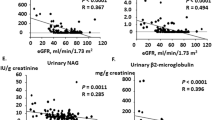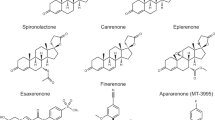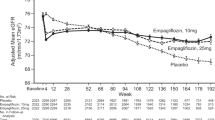Abstract
Hypertension is a major risk factor for the development and progression of chronic kidney disease (CKD). Mineralocorticoid receptor antagonists (MRAs) are effective in the management of resistant hypertension but are not widely used in CKD because of the risk of hyperkalemia. We retrospectively evaluated the long-term effects and safety of MRAs added to a pre-existing antihypertensive regimen in subjects with resistant hypertension associated with stage 3 CKD. In all, 32 patients were treated with spironolactone and 4 with eplerenone for a median follow-up of 312 days. MRAs induced a significant decrease in systolic blood pressure from 162±22 to 138±14 mm Hg (P<0.0001) and in diastolic blood pressure from 87±17 to 74±12 mm Hg (P<0.0001). Serum potassium increased from 4.0±0.5 to 4.4±0.5 mEq l−1 (P=0.0001), with the highest value being 5.8 mEq l−1. The serum creatinine increased from 1.5±0.3 to 1.8±0.5 mg dl−1 (P=0.0004) and the estimated glomerular filtration rate decreased from 48.6±8.7 to 41.2±11.5 ml min−1 per 1.73 m2 (P=0.0002). One case of acute renal failure and three cases of significant hyperkalemia occurred. MRAs significantly reduced blood pressure in subjects with resistant hypertension associated with stage 3 CKD, although close biochemical monitoring is recommended because of an increased risk of hyperkalemia and worsening of renal function.
This is a preview of subscription content, access via your institution
Access options
Subscribe to this journal
Receive 12 digital issues and online access to articles
$119.00 per year
only $9.92 per issue
Buy this article
- Purchase on Springer Link
- Instant access to full article PDF
Prices may be subject to local taxes which are calculated during checkout


Similar content being viewed by others
References
Ruggenenti P, Perna A, Mosconi L, Pisoni R, Remuzzi G . Urinary protein excretion rate is the best independent predictor of esrf in non-diabetic proteinuric chronic nephropathies. ‘Gruppo italiano di studi epidemiologici in nefrologia’ (gisen). Kidney Int 1998; 53: 1209–1216.
Chobanian AV, Bakris GL, Black HR, Cushman WC, Green LA, Izzo JL et al. The seventh report of the Joint National Committee on Prevention, Detection, Evaluation, and Treatment of high blood pressure. The JNC 7 report. JAMA 2003; 289: 2560–2572.
Kidney Disease Outcomes Quality Initiative (K/DOQI). K/DOQI clinical practice guidelines on hypertension and antihypertensive agents in chronic kidney disease. Am J Kidney Dis 2004; 43: S1–S290.
Go AS, Chertow GM, Fan D, McCulloch CE, Hsu CY . Chronic kidney disease and the risks of death, cardiovascular events, and hospitalization. N Engl J Med 2004; 351: 1296–1305.
Jafar TH, Stark PC, Schmid CH, Landa M, Maschio G, de Jong PE . Progression of chronic kidney disease: the role of blood pressure control, proteinuria, and angiotensin-converting enzyme inhibition: a patient-level meta-analysis. Ann Intern Med 2003; 139: 244–252.
Berl T, Hunsicker LG, Lewis JB, Pfeffer MA, Porush JG, Rouleau JL et al. Impact of achieved blood pressure on cardiovascular outcomes in the Irbesartan Diabetic Nephropathy Trial. J Am Soc Nephrol 2005; 16: 2170–2179.
Pohl MA, Blumenthal S, Cordonnier DJ, De Alvaro F, Deferrari G, Eisner G et al. Independent and additive impact of blood pressure control and angiotensin ii receptor blockade on renal outcomes in the Irbesartan Diabetic Nephropathy Trial: clinical implications and limitations. J Am Soc Nephrol 2005; 16: 3027–3037.
Chapman N, Dobson J, Wilson S, Dahlof B, Sever PS, Wedel H et al. Effect of spironolactone on blood pressure in subjects with resistant hypertension. Hypertension 2007; 49: 839–845.
Nishizaka MK, Zaman MA, Calhoun DA . Efficacy of low-dose spironolactone in subjects with resistant hypertension. Am J Hypertens 2003; 16: 925–930.
Schepkens H, Vanholder R, Billiouw JM, Lameire N . Life-threatening hyperkalemia during combined therapy with angiotensin-converting enzyme inhibitors and spironolactone: an analysis of 25 cases. Am J Med 2001; 110: 438–441.
Levey AS, Bosch JP, Lewis JB, Greene T, Rogers N, Roth D . A more accurate method to estimate glomerular filtration rate from serum creatinine: a new prediction equation. Ann Intern Med 1999; 130: 461–470.
Schjoedt KJ, Rossing K, Juhl TR, Boomsma F, Rossing P, Tarnow L et al. Beneficial impact of spironolactone in diabetic nephropathy. Kidney Int 2005; 68: 2829–2836.
Bianchi S, Bigazzi R, Campese VM . Long-term effects of spironolactone on proteinuria and kidney function in patients with chronic kidney disease. Kidney Int 2006; 70: 2116–2123.
Chrysostomou A, Pedagogos E, MacGregor L, Becker GJ . Double-blind, placebo-controlled study on the effect of the aldosterone receptor antagonist spironolactone in patients who have persistent proteinuria and are on long-term angiotensin-converting enzyme inhibitor therapy, with or without an angiotensin ii receptor blocker. Clin J Am Soc Nephrol 2006; 1: 256–262.
Bomback AS, Kshirsagar AV, Amamoo MA, Klemmer PJ . Change in proteinuria after adding aldosterone blockers to ace inhibitors or angiotensin receptor blockers in ckd: a systematic review. Am J Kidney Dis 2008; 51: 199–211.
Bomback AS, Klemmer PJ . The incidence and implications of aldosterone breakthrough. Nat Clin Pract Nephrol 2007; 3: 486–492.
MacGregor GA, Markandu ND, Rotellar C, Smith SJ, Sagnella GA . Different effect of nifedipine in normotensive and hypertensive individuals: a functional anomaly of vascular smooth muscle in essential hypertension? Rev Esp Cardiol 1983; 36: 473–477.
Ahuja TS, Freeman Jr D, Mahnken JD, Agraharkar M, Siddiqui M, Memon A . Predictors of the development of hyperkalemia in patients using angiotensin-converting enzyme inhibitors. Am J Nephrol 2000; 20: 268–272.
Bakris GL, Weir MR . Angiotensin-converting enzyme inhibitor-associated elevations in serum creatinine: is this a cause for concern? Arch Intern Med 2000; 160: 685–693.
Arima S . Aldosterone and the kidney: rapid regulation of renal microcirculation. Steroids 2006; 71: 281–285.
Loutzenhiser R, Griffin KA, Bidani AK . Systolic blood pressure as the trigger for the renal myogenic response: protective or autoregulatory? Curr Opin Nephrol Hypertens 2006; 15: 41–49.
Wright Jr JT, Bakris G, Greene T, Agodoa LY, Appel LJ, Charleston J et al. African American Study of Kidney Disease and Hypertension Study Group: effect of blood pressure lowering and antihypertensive drug class on progression of hypertensive kidney disease: results from the AASK trial. JAMA 2002; 288: 2421–2431.
Khosla N, Kalaitzidis R, Bakris GL . Predictors of hyperkalemia risk following hypertension control with aldosterone blockade. Am J Nephrol 2009; 30: 418–424.
Acknowledgements
This study was supported by NHLBI RO1-HL79040 (David A Calhoun) and T32 HL007457 (Roberto Pisoni)
Author information
Authors and Affiliations
Corresponding author
Ethics declarations
Competing interests
The authors declare no conflict of interest.
Rights and permissions
About this article
Cite this article
Pisoni, R., Acelajado, M., Cartmill, F. et al. Long-term effects of aldosterone blockade in resistant hypertension associated with chronic kidney disease. J Hum Hypertens 26, 502–506 (2012). https://doi.org/10.1038/jhh.2011.60
Received:
Revised:
Accepted:
Published:
Issue Date:
DOI: https://doi.org/10.1038/jhh.2011.60
Keywords
This article is cited by
-
Antihypertensive effects and safety of esaxerenone in patients with moderate kidney dysfunction
Hypertension Research (2021)
-
Management of hyperkalemia in patients with kidney disease: a position paper endorsed by the Italian Society of Nephrology
Journal of Nephrology (2019)
-
Should All Patients with Resistant Hypertension Receive Spironolactone?
Current Hypertension Reports (2016)
-
Effect of aldosterone antagonists on blood pressure in patients with resistant hypertension: a meta-analysis
Journal of Human Hypertension (2015)
-
Aldosterone and glomerular filtration – observations in the general population
BMC Nephrology (2014)



